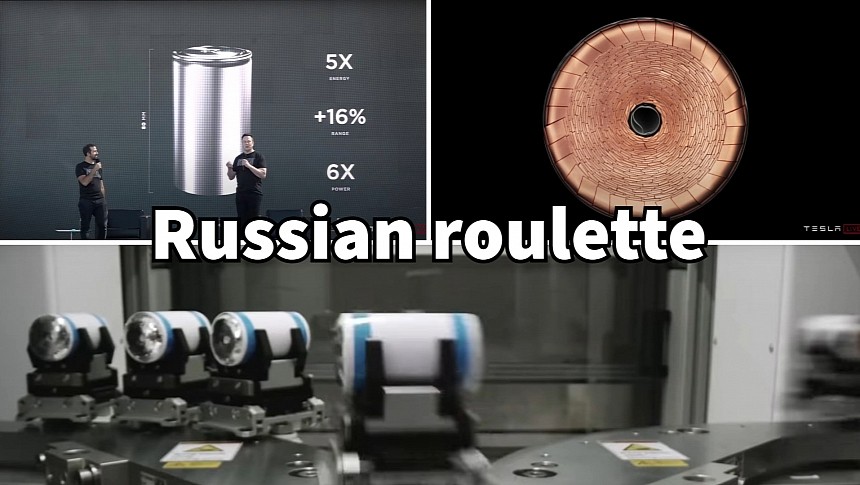Tesla is having difficulties ramping up 4680 battery cell production at Giga Texas. To compensate, it started importing battery components from China in the second half of 2023. This was an emergency solution that might affect the quality of the cells used in the first Cybertruck batches.
Tesla is still working hard to ramp up 4680 cell production at Giga Texas to satisfy the demand. The larger cells are now exclusively used in the Cybertruck's battery pack, and Tesla has problems producing as many as it needs. The EV maker is currently the sole manufacturer of 4680 cells after Panasonic hit a snag with 4680 cell development. This puts the whole Cybertruck program in jeopardy, as the electric pickup was designed to use the 4680 cells.
A report from China shows that Tesla resorted to an emergency solution to speed up 4680 cell production, although this might not make early Cybertruck owners very happy. More specifically, Tesla is importing cathode coils from two second-tier Chinese battery makers and shipping them to Giga, Texas, for the 4680 cell production. It was forced to settle with these second-tier suppliers after the industry leaders CATL and BYD declined to sell Tesla the parts.
Although this might sound like a nothingburger, battery experts warn that it's actually bad, and this is why BYD and CATL refused to fill the order. The two major battery manufacturers urged Tesla to buy complete cells instead, which Tesla also rejected. Battery manufacturing requires a sterile environment from start to finish, which is why battery manufacturers prefer to produce the entire cell on the same dust-free production line.
Cathode coils also require special conditions for transportation, with air-tight packaging. Besides that, they need to be made into cells as soon as possible, as they start developing quality issues after less than a week. This rules out shipping them on water, with airplanes as the only viable solution. As you can imagine, it's also expensive as hell, blowing up Tesla's manufacturing costs. There's also a high probability that the 4680 cells built with the imported cathode coils might inherit nasty quality issues.
I imagine Tesla must've been in a desperate situation to import these components from China, all quality issues and costs considered. The report claims that Tesla will probably continue to import cathode coils into the third quarter of this year. This is the moment Tesla's partner Panasonic is expected to start production of its own 4680 cells. However, if this doesn't happen, Tesla will be forced to continue the imports.
Based on recent reports, Tesla is slowly increasing the Cybertruck production while also inviting more reservation holders to place an order. How fast it could ramp up production now depends on the 4680 cell production, which is the main bottleneck. This explains why Tesla went through all the trouble with the cathode coil imports. Still, this also indicates that the Cybertrucks produced this year might be prone to battery defects. It could be the reason why Tesla is limiting the charging current of the 4680 cells, making the Cybertruck slower to charge than competing EVs.
A report from China shows that Tesla resorted to an emergency solution to speed up 4680 cell production, although this might not make early Cybertruck owners very happy. More specifically, Tesla is importing cathode coils from two second-tier Chinese battery makers and shipping them to Giga, Texas, for the 4680 cell production. It was forced to settle with these second-tier suppliers after the industry leaders CATL and BYD declined to sell Tesla the parts.
Although this might sound like a nothingburger, battery experts warn that it's actually bad, and this is why BYD and CATL refused to fill the order. The two major battery manufacturers urged Tesla to buy complete cells instead, which Tesla also rejected. Battery manufacturing requires a sterile environment from start to finish, which is why battery manufacturers prefer to produce the entire cell on the same dust-free production line.
Cathode coils also require special conditions for transportation, with air-tight packaging. Besides that, they need to be made into cells as soon as possible, as they start developing quality issues after less than a week. This rules out shipping them on water, with airplanes as the only viable solution. As you can imagine, it's also expensive as hell, blowing up Tesla's manufacturing costs. There's also a high probability that the 4680 cells built with the imported cathode coils might inherit nasty quality issues.
I imagine Tesla must've been in a desperate situation to import these components from China, all quality issues and costs considered. The report claims that Tesla will probably continue to import cathode coils into the third quarter of this year. This is the moment Tesla's partner Panasonic is expected to start production of its own 4680 cells. However, if this doesn't happen, Tesla will be forced to continue the imports.
Based on recent reports, Tesla is slowly increasing the Cybertruck production while also inviting more reservation holders to place an order. How fast it could ramp up production now depends on the 4680 cell production, which is the main bottleneck. This explains why Tesla went through all the trouble with the cathode coil imports. Still, this also indicates that the Cybertrucks produced this year might be prone to battery defects. It could be the reason why Tesla is limiting the charging current of the 4680 cells, making the Cybertruck slower to charge than competing EVs.







